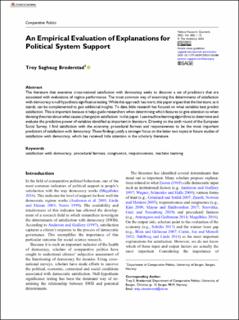An Empirical Evaluation of Explanations for Political System Support
Journal article, Peer reviewed
Published version

View/
Date
2023Metadata
Show full item recordCollections
Abstract
The literature that examines cross-national satisfaction with democracy seeks to discover a set of predictors that are associated with evaluations of regime performance. The most common way of examining the determinants of satisfaction with democracy is null hypothesis significance testing. While this approach has merit, this paper argues that the literature, as it stands, can be complemented to gain additional insights. To date, little research has focused on what variables best predict satisfaction. This is important because it helps guide researchers when determining which features to give attention to when devising theories about what causes (changes) in satisfaction. In this paper, I use machine learning algorithms to determine and evaluate the predictive power of variables identified as important in literature. Drawing on the sixth round of the European Social Survey, I find satisfaction with the economy, procedural fairness and responsiveness to be the most important predictors of satisfaction with democracy. These findings justify a stronger focus on the latter two topics in future studies of satisfaction with democracy, which has received little attention in the scholarly literature.
